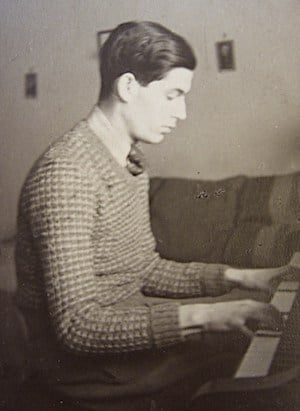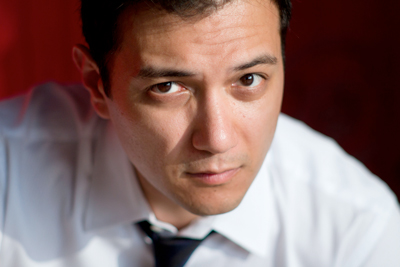by Daniel Hathaway
This busy weekend will feature two more concerts connected to the Baldwin Wallace Bach Festival.
On Saturday at 7 pm, the festival presents Bach 52, with Nicholas Phan, tenor (pictured), Debra Nagy, oboes & director, Gaia Saetermoe-Howard, oboes, Rebecca Reed, viola da gamba and cello & Mark Edwards, harpsichord and organ. In his ongoing Bach52 podcast and recording project, Phan asks “Is Bach’s music for everyone?”
Then on Sunday at 2 pm. Steve Reich’s Proverb and Piano Phase will be presented side by side with Bach’s cantata, “Christ lag in Todesbanden,” BWV 4, featuring members of BWV: Cleveland’s Bach Choir and Rob Kovacs, piano. Both events will take place in Gamble Auditorium in Berea.
On Saturday and Sunday at 3 pm at the Cleveland Museum of Art, CIM Opera stages Tom Cipullo’s 2007 opera Glory Denied, guest directed by Kathryn Frady & conducted by Kamna Gupta, based on the Vietnam-era experiences of Colonel Floyd James “Jim” Thompson, America’s longest-detained prisoner of war.
Also on Saturday, at 6:30 pm Emanuela Friscioni & Julia Russ will make the third attempt to play their twice-postponed-by-weather, four-hand piano concert, “Celestial Harmonies” at St. Francis of Assisi Church in Gates Mills.
On Saturday evening, in a 7:30 pm collaboration between Cleveland Jazz Orchestra and The Musical Theater Project, Bill Rudman and CJO’s Paul Ferguson will co-host an evening with Rodgers & Hart from the Great American Songbook at the Maltz Performing Arts Center.
And on Sunday at 3 pm, organist Todd Wilson will fire up the restored E.M. Skinner instrument in Morley Music Hall at Lake Erie College in Painesville.
For details, visit our Concert Listings.
ANNOUNCEMENTS:
Theodore Albrecht, Beethoven scholar and emeritus professor of music at Kent State University, writes to tell us that he has just received author copies of Beethoven’s Ninth Symphony: Rehearsing and Performing its 1824 Premiere from his publisher, Boydell and Brewer. The book “brings to life the day-to-day details of staging the premiere of one of the most iconic works of Western classical music.”
“It reads almost like a novel, but every historical word is true, every conversation authentic,” Albrecht writes, noting that while the institutional/library price is $105, he has negotiated a lowered price of $49.95 for individual buyers who use the link above.
NEWS BRIEFS:
The Contemporary Youth Orchestra has received a Grant for Arts Project from the National Endowment for the Arts to support performances of a commissioned work that reflects on the mass shooting at Emanuel AME Church in Charleston, S.C. on June 17, 2015. “We are working with Akron-based saxophonist, composer and teacher Chris Coles to reimagine his Nine Lives Project for youth orchestra, and will be premiering this new work on May 17.” Read the press release here.
WEEKEND ALMANAC:
January 27 — by Jarrett Hoffman:
Anniversaries on this particular date in classical music history go on and on — the birth of Mozart (Salzburg, 1756) and the death of Verdi (age 87 in Milan, 1901) just scratch the surface.

Beginning in Klein’s late teens, anti-Semitism stood firmly in the way of furthering his education and his career. After the Nazi occupation of what was then Czechoslovakia, institutions of higher learning were closed, and Klein was forced to discontinue his studies in philosophy and musicology at Charles University — fortunately he had already completed his studies in piano at the Prague Conservatory. Offered a scholarship at the Royal Academy of Music in London, that was also out of the question due to Nazi laws on emigration. And when Jewish musicians could no longer publicly perform — or have their works performed — he took on the alias of Karel Vranek, or played in private homes.
In 1941 he was deported to Terezín, where he became an important part of the camp’s cultural life — which at first operated in secret, and later under the sanctioning of the Nazis for the purposes of propaganda at this “model ghetto.” As a pianist, he performed works of Mozart, Beethoven, Schumann, Brahms, Suk, Janáček, Schoenberg, Scriabin, and Bach at Terezín, often in programs repeated up to eleven times due to popular demand.
Among several pieces that Klein composed while detained there is the 1944 String Trio. As Lucy Miller Murray writes in Chamber Music: An Intensive Guide for Listeners, you can hear in that work “not only the circumstances under which it was written, but also Klein’s musical gifts that reflected his Czech origins and his admiration of the adventurous Second Viennese School led by Arnold Schoenberg.”
Click here to watch a 2015 performance by students of the Colburn School. The lengthy second-movement Lento, a set of variations on the Moravian folk song The Kneždub Tower, begins at 2:45, and is known to be particularly striking.
In October of 1944, nine days after completing the Trio, Klein was moved to Auschwitz, then to the coal-mining labor camp Fürstengrube, where he died under unclear circumstances. A girlfriend of his at Terezín, Irma Semtzka, had been entrusted with the scores he had written there. After she survived the war, she delivered the manuscripts to the composer’s sister Eliska Kleinova — a survivor of Auschwitz herself — who in 1946 went on to arrange the first complete concert of the music of her brother, Gideon Klein.
You can read more about music under the Nazi regime here from the U.S. Holocaust Memorial Museum.
January 28 — by Mike Telin:
January 28 marks the birth of Polish-American pianist Arthur Rubinstein in 1887 in Łódź, Poland. With a career spanning eight decades, he is regarded as one of the greatest pianists — and the greatest interpreter of Chopin — of all time. Relocating to California during WWII, he became a naturalized U.S. Citizen in 1946. He also lent his talents to Hollywood, providing piano soundtracks for films, including Song of Love with Katharine Hepburn, and playing himself in Carnegie Hall and Of Men and Music. Click here to watch a documentary of his life with historic film footage.
On this date in 1944, British avant-garde composer John Tavener was born in London. We featured his life in our Daily Diary for November 12, 2020, marking the date of his demise.
And on January 28 in 1956 American composer and Oberlin alum Richard Danielpour was born in New York City. Click here to watch pianist Chelsea de Souza, another Oberlin alum and a Tuesday Musical Scholarship recipient perform his Enchanted Garden, Book I.
Finally, today we note the passing of violin virtuoso Fritz Kreisler on this date in 1962. Like Rubinstein, he was regarded as one of the greatest musicians of all time. Listen to a WQXR interview on his 80th birthday in 1955 here. Kreisler was famous for his encores, and you can binge-listen to two hours and thirteen minutes worth of them here.




